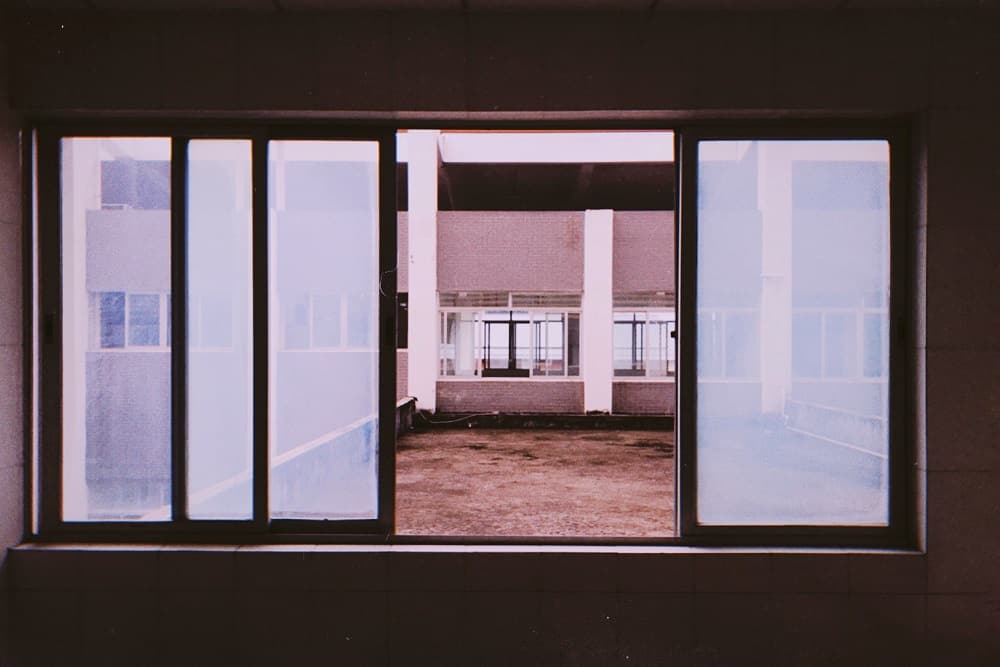When building a home from scratch, you should always think long-term. If a design looks nice now, great! But are you going to have to change the window later on for one that is more convenient? Let’s start by understanding three of the most popular window types so that you can decide which one suits your construction project the best!
Casement vs. Sliding vs. Hung Windows 101
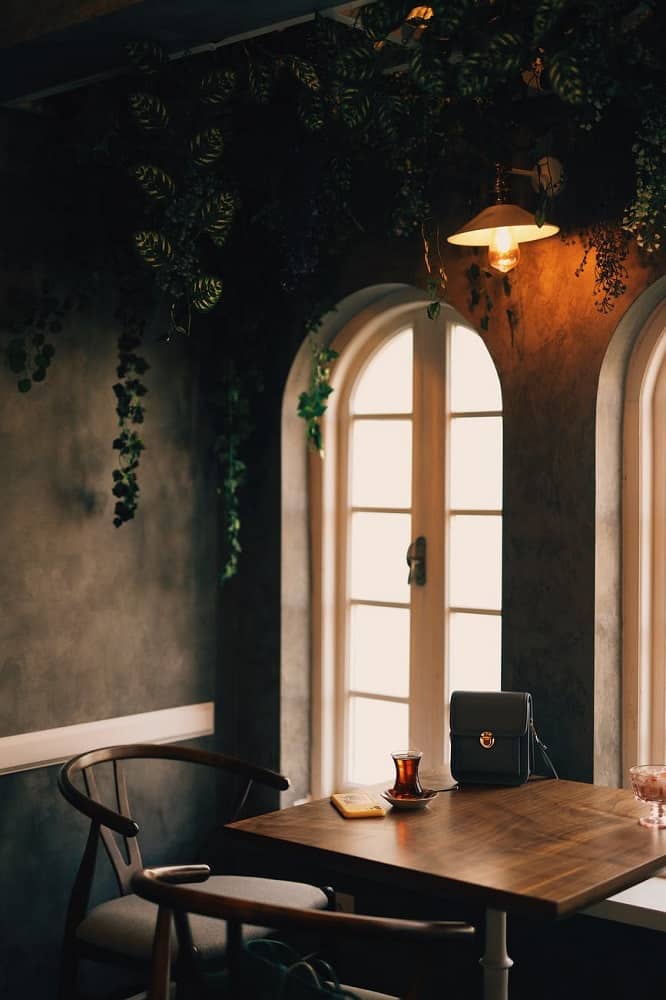
Each window style serves a specific purpose in construction. Depending on the style, you can have a better view, more fluidity in a home’s design, and even more safety. Though the aesthetic is vital, according to the experts, here are 5 crucial characteristics you should check when selecting your ideal windows:
- Ventilation
Fresh air is essential to dilute indoor pollutants (dust, gasses, even moisture) and maintain air quality.
- Accessibility and convenience
Is the window easy to open? Will it be cost-effective to maintain and clean in the long run?
- Energy-efficiency and performance
Energy-efficient windows prevent heated or conditioned air from escaping your home and reduce heat transfer in both directions. The increased insulation reduces the building’s energy usage. Always check the window labels and the ratings. The most used energy ratings on an NFRC label are Solar Heat Gain and U-factor.
Weather stripping needs to close tightly even after many storms, winters, and dry summers, sealing against weather and outdoor elements.
- Safety
Protecting your home is key. The windows must be made of durable materials and locking technology to avoid break-ins.
- Design
You should adhere to the architectural aesthetic of your home for the windows to flow with the overall design. If you have a picturesque view and know where the sun hits during the day, choose a design that will take advantage of the view and lighting.
3 Popular Types of Windows For New Construction
There are many different styles and variations of each one. These are three of the most popular windows: casement, sliding, and hung windows.
Casement Windows
A crank window, also referred to as a casement, has a single sash, which opens when the handle mechanism is turned. It is a simple window and it opens like a door, inwards or outwards depending on the model. The frame should be made of thermally non-conductive material. Let’s review the details.
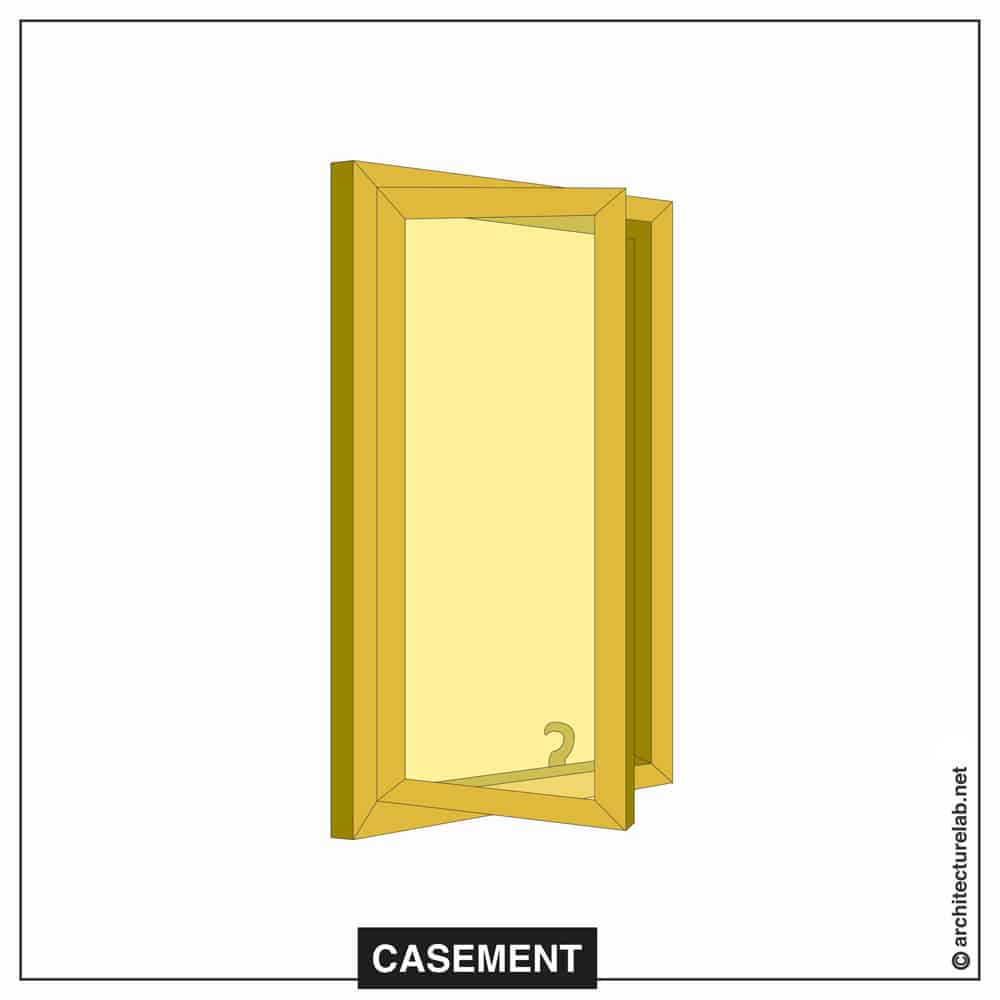
- Ventilation
Some casement models open completely, allowing more air into the home, therefore, more ventilation. Because of its structure, this window style allows you to control and divert wind into your home.
- Accessibility and convenience
This style makes it easier to open, which is great for people who struggle with opening heavy windows. It is also more comfortable to clean and inspect.
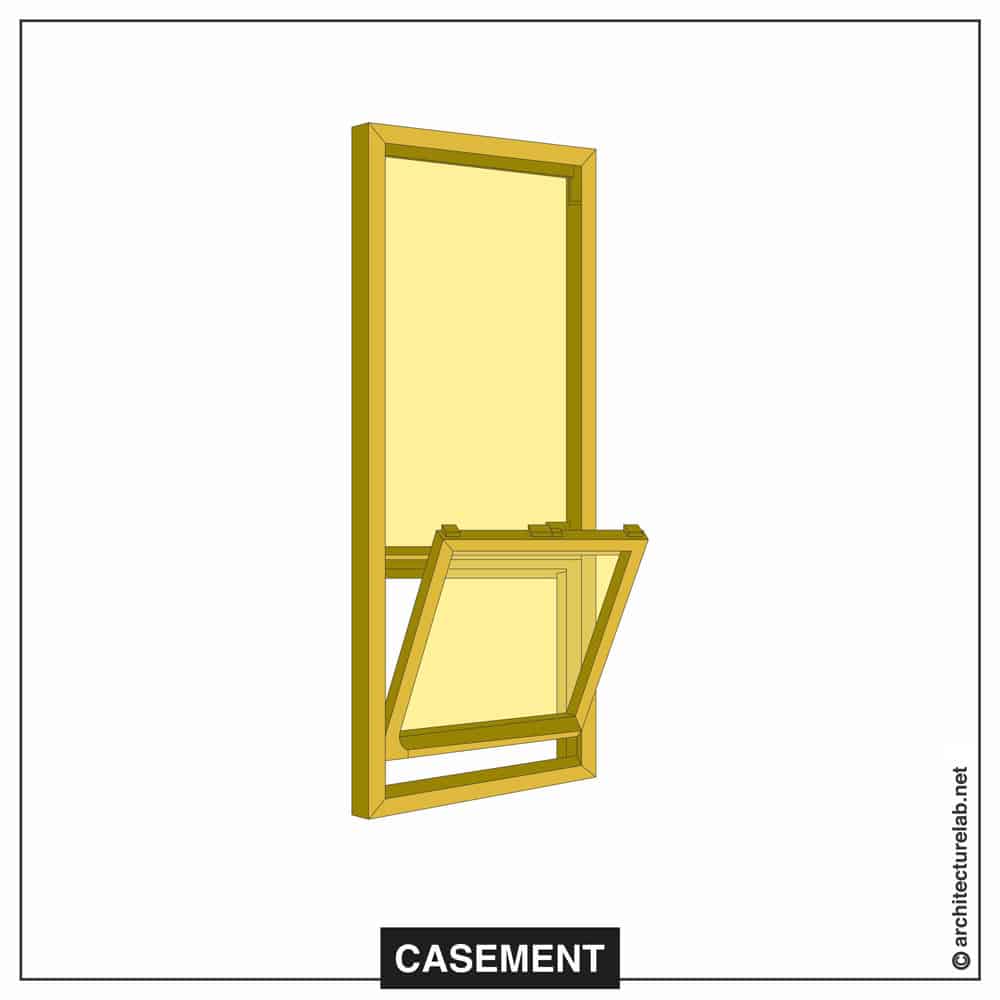
- Energy-efficiency and performance
This is the best window when it comes to energy efficiency. Its locking mechanism secures the window in four places, and the weather stripping fastens around the sash to seal tightly, unlike other styles.
When locked, they press tightly against the frame, creating a potentially stronger seal compared to some other window types, this also translates into better insulation and a certain better window noise reduction.
- Safety
It is one of the most secure window types since there is no way for an intruder to turn the crank from the outside. To make it even more secure, you can remove the crank and keep it nearby yet out of reach.
- Design
These windows have been very popular for centuries. They have a traditional design, but some people prefer the fuller opening that modern ones provide. They are versatile, timeless, and can fit any home style.
Pros
- Ventilation. These are the best windows for ventilation because they can open fully.
- Energy-efficient. When closed, they are the most energy-efficient of all operable window types. Great for windy areas.
- Easy to clean. Especially for hard-to-reach places, these allow you to clean the window from the inside of the house.
- Versatile. They allow for a traditional look and can be modernized to fit many architectural styles.
Cons
- Mechanical parts durability. If not maintained well, the crank might get out of service pretty soon, causing troubles with window operation.
- Size limits. Because of their structure and material, they can’t be made past a certain size (which is a disadvantage when you want to frame a beautiful view).
Sliding Windows
Sliding windows operate by moving one panel horizontally along a track while keeping another panel stationary.

- Ventilation
They can only be partially opened, limiting the amount of natural airflow. For a room that demands maximum ventilation go for three-panel-sliding windows over the two-panel ones.
- Accessibility and convenience
These are cost-effective compared to other windows of modern types such as bay and bow units, for example, and since sliders last longer with less maintenance, you won’t have to replace the windows down the line. They have a simple opening mechanism that allows the panel to slide along the track.
- Energy-efficiency and performance
Modern Energy Star-rated sliders have high-quality Low-E coated glass, reflecting infrared light and offering superior thermal insulation. This also reduces outside noise… an added bonus!
- Safety
It usually comes with a cam-action lock that doesn’t allow the pane to slide. You can also install a burglar bar which, with the tension, an intruder cannot open the window.
- Design
They are best used for constructions with a hi-tech design that requires a modern touch since sliders provide beautiful and expansive views while saving space.
Pros
- Variety. You can choose two panels or three panels for maximum ventilation.
- Easy to use. Easy to open and close, great for people with less strength since these are lightweight.
- Unobstructed views. A huge glass area allows for clear views outside.
- Versatile. They allow for a modern look and can be modernized to fit many architectural styles.
Cons
- Limited ventilation. Compared to casement windows, these offer less ventilation since they are not open fully.
- Difficult to clean. If on a higher level than the ground, it can be hard to safely clean the outside unless the windows tilt or can be removed (which is an added cost).
- Price. usually, sliders come with a higher price tag than other operable window styles.
Hung Windows
Hung windows are actually very similar to sliding units, so they are often called vertical sliders due to their sashes operating vertically. There are single and double-hung variations of this window type. The latter has operable top and bottom sashes, moving up and down, while the former has just one moving sash while another remains fixed.
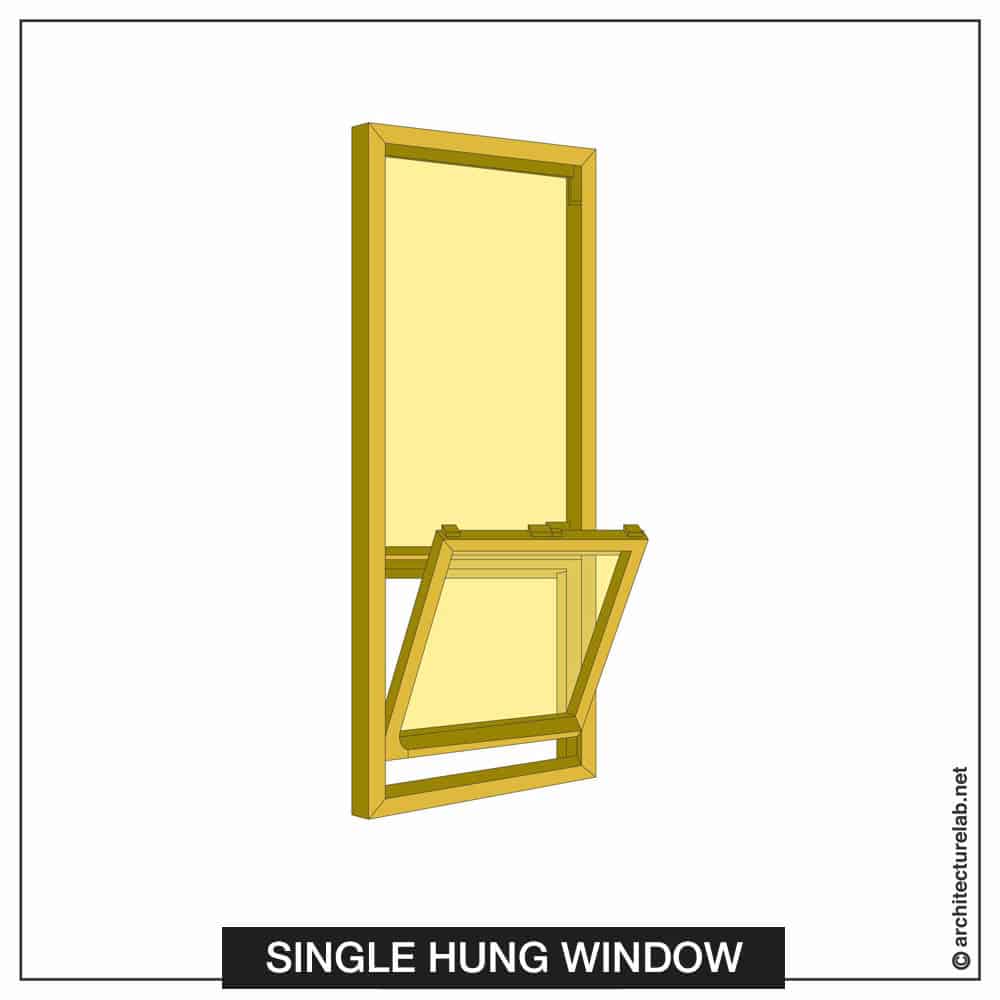
- Ventilation
The sashes tilt, which allows for a smoother cleaning process. Moreover, these windows can be placed strategically in almost all rooms within your house. However, they are usually installed in bathrooms or bedrooms for maximum ventilation.
- Accessibility and convenience
The sashes tilt which allows for a smoother cleaning process. The single-hung style is usually less expensive than the double-hung window. Singles are cheaper to purchase and install than doubles.
- Energy-efficiency and performance
Single-hung windows tend to be more energy-efficient than double-hung windows since they feature one fixed panel. Still, overall Hung windows are very energy efficient and inferior only to casement windows among all operable units.
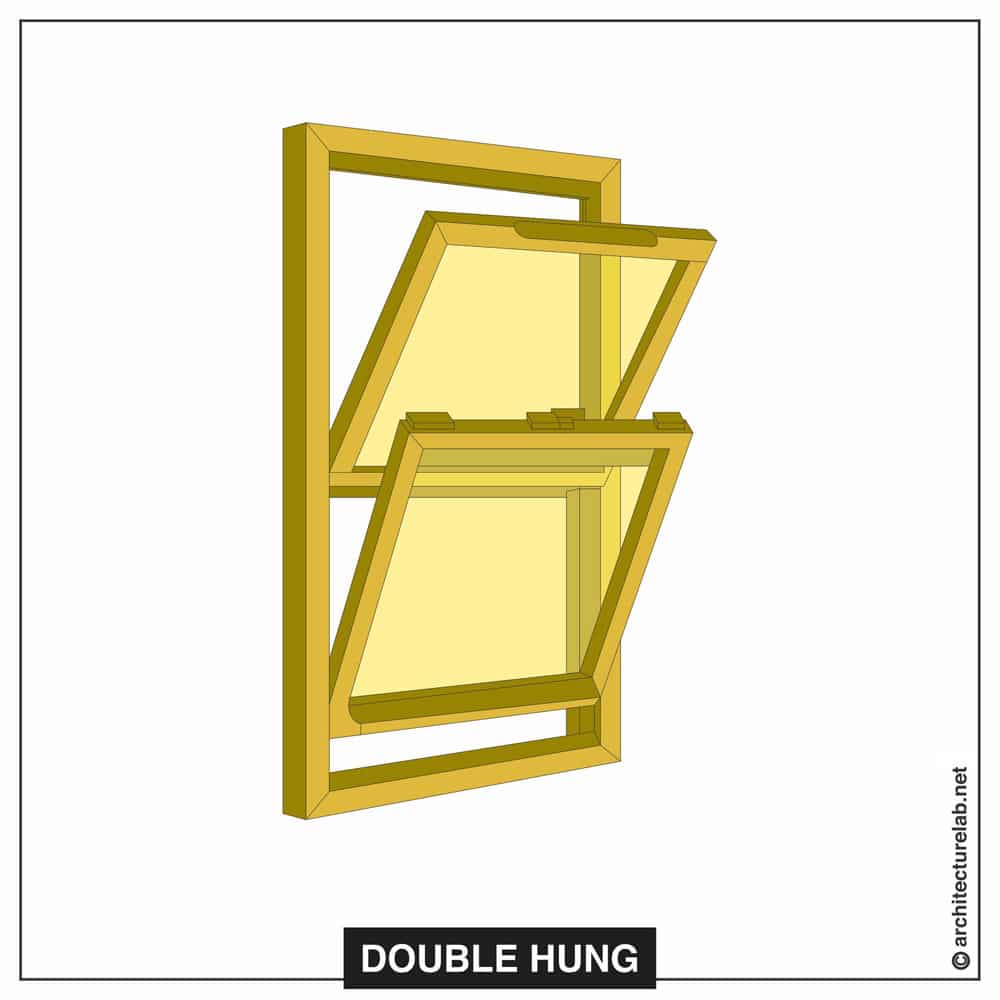
- Safety
The safety point is similar to the one sliding windows have to offer. Moreover, in the case of double-hung windows, the units are considered to be childproof since you can choose to close the bottom sash for safety and open the upper one for ventilation.
- Design
Hung windows offer timeless, beautiful, and minimalist design; they’re a classic for residential windows and provide a traditional touch to any construction.
Pros
- Variety. Choose a single or double-hung style to match your exterior perfectly.
- Easy and safe to clean. Being able to tilt the sashes allows you to clean from every angle and stay safely inside while cleaning the glass.
- Optimal ventilation. With one or both sashes to be open, you can enjoy the optimal level of air circulation within your space.
Cons
- Not 100% airtight. Though they have few air leaks, they are not as airtight as some other types of windows.
- No clear views outside. Because of two sashes connected in the middle part of the window, you might struggle to enjoy your great views outside.
Which Window Style is the Best?
It is tough to state objectively that a certain window style is better than another. The answer varies, and the best way to figure out which one is the best option for you is to compare each window style and see which one suits your needs.

Casement vs Sliding vs Hung Windows – Which One Do I Choose?
Casement vs. Sliding Windows
- Casement windows are great for small openings while having an unobstructed view. These are best if the wood is your material of preference. Sliding windows are more suited for large horizontal openings and usually come in vinyl and fiberglass. If you don’t have enough outdoor clearance, the sliding window is an excellent alternative to the casement style.
- Maintenance is something essential to consider in the long term for whoever moves into the home. Sliding windows tend to collect more dust on the tracks than others. At the same time, casement windows need up-keeping to move smoothly because of the crank.
- Both are very energy-efficient, but casement windows are recognized as the most energy-efficient windows among all operable units. So if your main goal is to cut down on energy bills – casements are your go-to option for sure.
- Sliding windows are usually more expensive than casement windows and can require more maintenance, making them a tad more expensive long-term.
Sliding vs. Hung Windows
- Sliding windows are larger than hung windows. They provide a larger and more unobstructed view of the landscape.
- On the other hand, many hung windows have tilt-in cleaning, simplifying their maintenance compared to sliding windows that tend to be hard to reach externally. So, sliding windows are ideal if you value a picturesque view and ventilation in your home over maintenance.
- When it comes to cost, hung windows are more affordable than sliders and since they can be placed strategically, hung windows are more popular among Canadians.
Hung vs. Casement Windows
- The major advantage of casement windows overhungc units is that casements open fully, while hung windows are limited. This allows for better air circulation.
- In terms of energy efficiency, both units are great, and if you go with single-hung windows, they will be almost on par with casements in terms of saving you money on energy bills.
- Both units have a traditional design that will fit almost any construction, complimenting your exterior perfectly.
So, which window to choose? At the end of the day, everything boils down to your personal preferences and budget.
- If you want to get more energy efficiency and better noise control- choose casement windows;
- If your exterior/interior demands a modern touch – sliders will be perfect;
- If you need to place your windows strategically fitting almost any rough opening – hung windows are your go-to option.
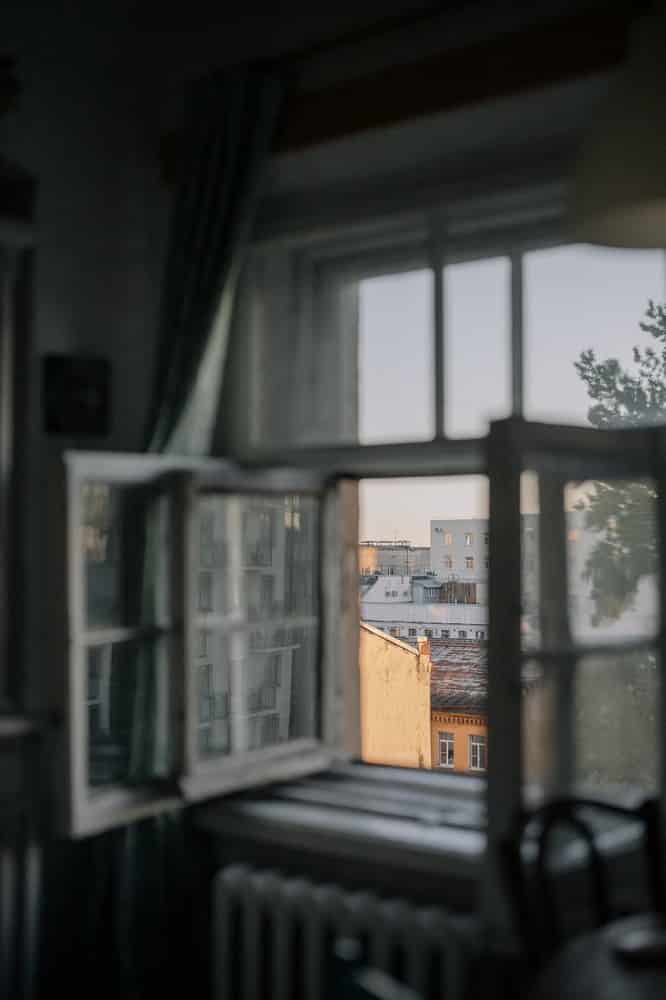
Casement vs Sliding vs Hung Windows Price Comparison
When shopping for new windows, the first thing to consider (for most homeowners) will be the price tag of the desired units. And that’s for a good reason since getting windows for a new construction definitely won’t be cheap. In this industry, you literally get what you pay for, so make sure not to fall victim to ads telling you about the cheap windows that will serve you for many years to come. That is why we have prepared a table for you representing the approximate quotes for the popular window types discussed previously. Remember that these are not the final quotes, and for more detailed price tags, you need to contact your local suppliers.
| Location | Casement Window | Sliding Window | Hung Window |
| Basement | $535 – $1,022 | $394 – $1057 | n\a |
| Bathroom | $446 – $1,032 | $394 – $1033 | $95 – $1500 |
| Bedroom | $444 – $1193 | $437 – $1521 | $587 – $2115 |
| Bonus room | $676 – $1134 | $820 – $1248 | $634 – $1374 |
| Dining room | $550 – $1348 | $669 – $1957 | $529 – $1466 |
| Family room | $605 – $1999 | $490 – $1131 | $569 – $1155 |
| Foyer | $858 – $1999 | $465 – $778 | $500 – $854 |
| Front | $583 – $1014 | $785 – $968 | $510 – $925 |
| Garage | n\a | $391 – $1085 | $588 – $732 |
| Kitchen | $329 – $1356 | $394 – $1595 | $445 – $1595 |
| Living room | $484 – $1614 | $433 – $2327 | $429 – $1614 |
| Master bedroom | $545 – $1304 | $452 – $1810 | n\a |
| Nook | $549 – $1149 | $658 – $1142 | $473 – $1186 |
Source https://www.ecolinewindows.ca
Where to Install Each Window Type?
Depending on a room’s purpose and its needs, it may warrant different window shapes and sizes, and there may be more things to consider.
- Floor Level
Casement windows are usually preferred on the first floor by homeowners because they are not as convenient to clean as hung windows on a second story. If you choose hung windows, go for singles on the first floor and double-hung windows on the upper levels, since they are easier to clean.
- Bedrooms
Usually, homeowners prefer hung windows for bedrooms since they are convenient, offer optimal ventilation, and do not require much maintenance.
- Bathrooms
For bathrooms, Canadians prefer to also go with hung windows that can be placed strategically, fitting any rough opening there.
Fun fact! Single-hung windows are the top choice in new home construction, while double-hung windows are the go-to in residential replacement windows. Casement windows are very popular over kitchen counters but they look fantastic in a living room or dining room.

The Bottom Line
There are many windows to choose from, but you should always make an informed choice that will benefit the look and feel of your construction long-term. Some of the final pieces of advice to keep in mind before purchasing new windows:
- Buy only Energy Star-rated windows. This will guarantee maximum energy efficiency and compliance with the highest industry standards.
- Consult with the experts (designers, manufacturers, installers) when choosing the type of windows for your project.
- Deal only with a reliable window company to install your windows since even the best units will not serve you long if installed poorly. Check the previous projects of your installers, and their online reviews, and ask for all necessary details before signing the installation contract.
Related Articles
15 Types of Windows Shades for Your Future Home
19 Best Door and Window Alarms
How To Choose Skirting Boards And Window Sills



